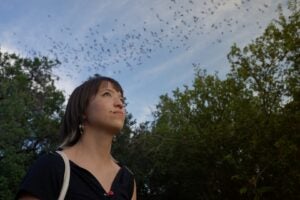The presidents of Texas’ two flagship universities, William Powers Jr. of The University of Texas at Austin and Elsa A. Murano of Texas AandM University, joined philanthropist George P. Mitchell in Houston Friday to generate state-wide support for the Giant Magellan Telescope (GMT), a project that will take Texas to the forefront of astronomy.
“The Giant Magellan Telescope project is a tantalizing dream,” Powers told the crowd at the Houston Club. “When it is completed, we will be able to observe the earliest stars in the universe, planets in other solar systems and supernovae with greater clarity and understanding.”
Mitchell’s previous $3.25 million gift to Texas AandM and matching funds from The University of Texas at Austin made the universities partners in the eight-member, $550 million GMT project. Mitchell said Friday he hopes the two universities can raise at least $55 million between them to receive a 10 percent share in the GMT. He plans to give Texas AandM another $1.5 million per year for five years, providing Texas AandM matches it.
“UT is honored to be a member of this consortium with six other prestigious institutions,” Powers said. “But we are especially proud to join Texas AandM in what is an unprecedented collaboration between Texas’s two major research universities. In fact, this may be our most ambitious partnership to date.
“When the Texas share of this project gives our researchers firsthand access to the images and information produced by the GMT, then Texas scientists from UT and AandM will help to solve the puzzles that have challenged our imaginations for centuries. And their discoveries will open the way for bold new science in the generations to come.”
When operational in northern Chile in 2017, the GMT will be the one of the world’s largest telescopes, producing images up to 10 times sharper than Hubble Space Telescope, and could shed light on the question of life beyond Earth. It will make visual images of distant planets, detect the basis of extra-solar life and peer into the universe’s formation.
“This is an extraordinarily exciting project that’s going to put Texas on the map in terms of astronomy,” said the Carnegie Institution’s Wendy Freedman, director of the GMT Consortium, which also includes the Carnegie Institution, the Smithsonian Institution, Harvard University, the University of Arizona, the Australian National University and Australia Astronomy Limited. South Korea has indicated it will join.
Today’s largest telescopes, including the Hobby-Eberly Telescope at The University of Texas at Austin’s McDonald Observatory in West Texas, have mirrors with effective diameters of up to 10 meters. McDonald Observatory Director David L. Lambert says the GMT will collect five times more light than the Hobby-Eberly Telescope and about 70 times as much light as Hubble Space Telescope.
“We would not be where we are without Mr. Mitchell’s early help,” Freedman said. “But after working on designs for several years, we now reach the project’s next phase of detailed design and raising funds for construction. And we hope to galvanize Texas to become a full participant.”
The GMT Consortium’s sense of urgency comes from two rival big-telescope projects, one planned by the California Institute of Technology and the University of California System, the other by the same 13-nation European consortium which built the world’s first superconducting super collider in Geneva, Switzerland, after such a project was derailed in Texas. All three telescopes are expected to near completion in a decade, about the same time the Hubble Telescope is expected to leave service.
“I challenge our top two universities – and all Texans – to meet the tough competition California offers in order to be at the center of high-energy physics,” Mitchell said.
Mitchell’s many gifts to The University of Texas at Austin include support for its Elementary Charter School, the School of Architecture and College of Engineering. His support for the physics program at his alma mater Texas AandM totals more than $51 million over several years.



